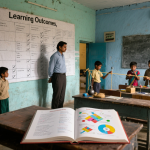- December 7, 2023
- by Educational Initiatives
- Blog
- 0 Comments
In a recent episode of Ei Dialogues, Sridhar Rajagopalan spoke to Andreas Schleicher, Director at the Directorate for Skills and Education at the OECD. A champion of a scientific approach to education, Andreas has pioneered the Programme for International Student Assessment (PISA) and is one of the foremost thought leaders on education across the world.
Sridhar and Andreas discuss PISA and the role it plays in education and policymaking. Andreas highlights how developing nations can improve learning outcomes without excessive financial investment, and how equity and excellence in education are two sides of the same coin. They also speak about the need for a “Science of Learning” to help educators diagnose and address students challenges, just as doctors use the science of medicine to treat patients. Looking forward, Andreas charts a path for schools, parents and policy-makers to strengthen education systems, taking lessons from their experiences during the COVID-19 pandemic.
You can get the episode on Apple Podcasts, Google Podcasts, Spotify, or wherever else you listen to podcasts.
The Need for a Science of Learning
With a background in the field of medicine, Andreas champions an evidence-based approach to education, believing it should be “not less of an art, but more of a science”. He critiqued conventional practices, which did not encourage educators to proactively improve teaching methods. He believed teaching was a very “inward-looking” profession where teachers and schools were not told to engage beyond their own classrooms in search of potentially better teaching methods.
He proposed that developing advances in pedagogy and classroom practices should be a system-wide responsibility, not the sole mandate of government ministries. In such a model, teachers would be tasked with collaboration and innovation, which he also noted increased job satisfaction in the profession. This was analogous to how in medicine, doctors are expected to partake in research and advance their field. He stressed the importance of doing this in an evidence-based manner. With tangible results, identifying and scaling successful practices becomes easier, as does improving or discarding unsuccessful ones.
Learnings from PISA
Having spearheaded PISA for over two decades, Andreas possessed a wealth of insights on what enabled high-performing education systems to succeed. He highlighted the ability to attract high-quality talent to the profession as a key determinant of a system’s success. Doing so, though, required more than just financial incentives. Making teaching an intellectually rewarding profession where teachers were encouraged to innovate was as important, if not more. This also supported his view on developing a science of learning, where educators are expected to innovate and actively enhance the teaching-learning process.
This fact also pointed to a larger trend in education systems, wherein financial investment was not the only predictor of an education system’s performance. Andreas noted that “the world is no longer divided into rich and well educated and poor and badly educated nations.” The experiences of countries like Vietnam proved that moderate amounts of investment, but guided by the right ambition and sound policy, could significantly improve learning outcomes among students. How money was spent in a system mattered just as much as how much money was spent.
The best performing systems, Andreas emphasized, saw excellence and equity in education as “two sides of the same coin, not opposite ends of the spectrum.” They recognised that all children had diverse learning needs and catered to them accordingly, instead of standardising teaching practices in a manner that served only a subset of students. This observation is especially valid in India’s context, where though the country increasingly produces leaders in industry, technology and academia from a small sliver of its population, the majority of its children lag far behind expected grade-level competencies.
Enhancing education moving forward
Andreas emphasized the need to adapt education systems for the 21st century, wherein soft skills like collaboration and empathy were just as important, if not more, than academic knowledge of mathematics and science. He spoke of PISA’s successful efforts to assess and measure such skills, but was dismayed at the muted response to them relative to results on academic subjects.
He also spoke of the need for systems to enable small efforts that could disproportionately improve student performance and well-being, such as greater parental involvement. This need not require significant skill or ability on the parents’ part, which might otherwise limit the potential of such actions in a country like India where numerous children are born to parents with little no formal education. Even just enquiry about a child’s school day, signaling interest in their education, has a demonstrable impact on learning outcomes. Such a shift broke the narrow boundaries of a “commodified” education system, wherein students are seen as consumers of a service provided by teachers, and parents as passive clients.
From a systemic perspective, he cautioned policy-makers from seeing new policy development or curricular reform as the solution to poor performance. This could potentially burden systems, especially those whose capacity is already worn thin. Instead, he proposes that officials develop a deeper understanding of ground realities in-class and find ways of empowering schools, teachers, and students. This sort of reform would likely yield faster results. It would also be beneficial for under-financed systems since it would not require significant investment, but a realignment of priorities and structures.
These insights from Andreas are also elaborated on in-depth in his book World-Class: How to Build a 21st-Century Education System. It is freely available on the website of the OECD.



